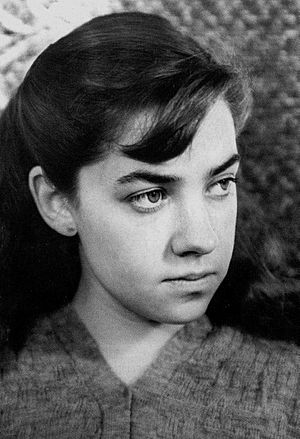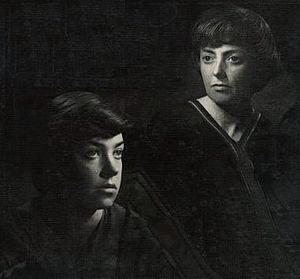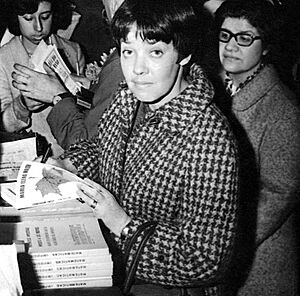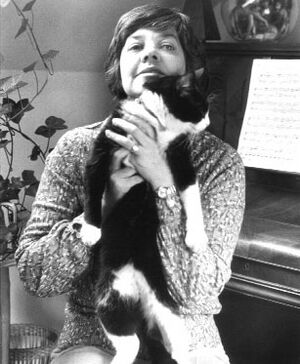María Elena Walsh facts for kids
Quick facts for kids
María Elena Walsh
|
|
|---|---|
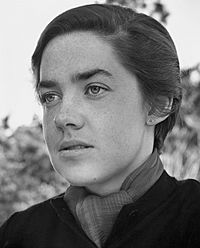
Walsh photographed by Grete Stern in 1952
|
|
| Born | 1 February 1930 Ramos Mejía, Argentina |
| Died | 10 January 2011 (aged 80) Buenos Aires, Argentina |
| Occupation | Poet, author, musician, writer |
| Genre | Children's literature, Autobiographical novel, poetry |
| Partner | Sara Facio (1978–2011) |
| Signature | |
María Elena Walsh (born February 1, 1930 – died January 10, 2011) was a famous Argentine poet, writer, and musician. She is best known for her amazing songs and books written especially for children.
Contents
About María Elena Walsh
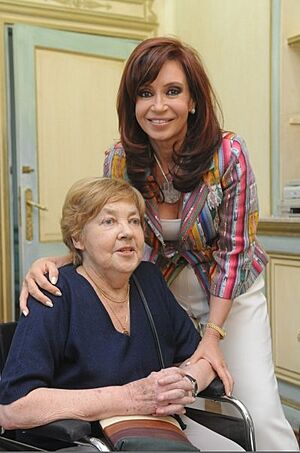
María Elena Walsh was born in Villa Sarmiento, Ramos Mejía, Argentina. Her father was an English railway worker who loved playing the piano. Her mother was an Argentine woman with Spanish roots.
She grew up in a big house filled with books and music. This cultural home helped her love for reading and music grow.
Early Life and First Works
When María Elena was just 15 years old, some of her poems were published. They appeared in a magazine called El Hogar and a newspaper named La Nación.
In 1947, even before finishing art school, she released her first book. It was a collection of poems called Otoño Imperdonable. Important writers in Latin America praised her work.
After graduating in 1948, she traveled to North America and Europe. She spent four years in Paris in the early 1950s. There, she performed Argentine folk music with another singer, Leda Valladares. They formed a duo called "Leda & María."
Return to Argentina and Children's Works
María Elena Walsh came back to Argentina in 1956. From 1958 onwards, she started writing many TV shows, plays, poems, and songs. She focused especially on young children.
She was also a very successful performer. She sang her own songs on stage and recorded them in albums. Some of her popular albums include Canciones para mirar and Canciones para mí.
Her album Juguemos en el mundo was a funny show for adults. It was later made into a film. The film used her characters Doña Disparate y Bambuco.
Messages in Her Work
María Elena Walsh's work often had a hidden message about society or politics. For example, her song "El País del Nomeacuerdo" ("I-Don't-Remember Land") was used in the film The Official Story. This film won an Academy Award for Best Foreign Language Film.
During a time when Argentina was ruled by a military government (1976–1983), she strongly spoke out against them. Her song "Oración a la justicia" (Prayer for Justice) became a symbol for civil rights. She even wrote an open letter criticizing the government's censorship. She called the country "Desventuras en el Pais-Jardín-de-Infantes" (Misadventures in the Preschool Country).
Awards and Recognition
María Elena Walsh received many honors for her work.
- In 1985, she was named Illustrious Citizen of the City of Buenos Aires.
- In 1990, she received an honorary doctorate from the National University of Córdoba.
- In 1994, she was highly praised for the Hans Christian Andersen Award. This award is given for children's books.
Many people consider her a "living legend" and a "cultural hero." Her work is seen as one of the most important in children's literature. Writer Leopoldo Brizuela said her work is like Alice or Pinocchio.
Death
María Elena Walsh passed away from bone cancer in Buenos Aires on January 10, 2011. She was 80 years old.
Personal Life
From 1978 until her death in 2011, María Elena Walsh's partner was Sara Facio. Sara Facio (born 1932) is a well-known Argentine photographer. She is famous for taking pictures of many cultural figures, including writers Julio Cortázar and Alejandra Pizarnik.
Books by María Elena Walsh
María Elena Walsh published her first poem when she was 15. She wrote over 40 books, mostly for her favorite audience: children!
- Books for adults
- Otoño imperdonable (1947) – published when she was 17
- Apenas Viaje (poems) (1948)
- Baladas con Angel (poems) (1951)
- Casi Milagro (poems) (1958)
- Hecho a Mano (poems) (1965)
- Juguemos en el mundo (poems) (1971)
- La Sirena y el Capitán (1974) – "The Mermaid and the Captain"
- Cancionero contra el Mal de Ojo (poems) (1976)
- Los Poemas (1982)
- Novios de Antaño (novel) (1990)
- Desventuras en el País-Jardín-de-Infantes (1993) – "Misfortunes in Kindergarten-Country." This book included her famous letter against censorship.
- Hotel Pioho's Palace (2002)
- Fantasmas en el Parque (2008)
- Books for children
- La Mona Jacinta (1960)
- La Familia Polillal (1960)
- Tutú Marambá (1960)
- Circo de Bichos (1961)
- Tres Morrongos (1961)
- El Reino del Revés (poems and songs) (1965)
- Zoo Loco (1965)
- Cuentopos de Gulubú (1966)
- Dailán Kifki (novel) (1966)
- Versos para Cebollitas (1966)
- Versos Folklóricos para Cebollitas (1967)
- Aire Libre (school book) (1967)
- Versos Tradicionales para Cebollitas (1967)
- El Diablo Inglés (short stories) (1970)
- Angelito (1974)
- El País de la Geometría (1974)
- Chaucha y Palito (short stories) (1977)
- Veo Veo (1984)
- Bisa Vuela (1985)
- Los Glegos (1987)
- La Nube Traicionera (1989)
Discography of María Elena Walsh
María Elena Walsh recorded many albums. Some were for children, and some were for adults. Her early albums were inspired by Argentine folklore. She worked with singer Leda Valladares on these.
Her album Canciones para Mí was her first solo release. It included popular songs like Canción de Tomar el Té and Manuelita la Tortuga. Manuelita la Tortuga became her most famous song.
- As "Leda y María", with Leda Valladares
- Chant d'Argentine (1954)
- Souns le Ciel de l'Argentine (1955)
- Entre Valles y Quebradas Vol. 1 & 2 (1957)
- Canciones del Tiempo de Maricastaña (1958)
- Leda y María Cantan Villancicos (EP) (1959)
- Canciones de Tutú Marambá (EP) (1960)
- As "María Elena Walsh"
- Canciones para Mirar (with Leda Valladares) (1962) – This album has classics like El Reino del Revés, Canción del Jardinero, La Vaca Estudiosa, and La Mona Jacinta.
- Doña Disparate y Bambuco (EP) (with Leda Valladares) (1962)
- Navidad para los Chicos (EP) (with Leda Valladares) (1963)
- Canciones para Mí (1963) – Her first solo album, with hits like Canción de tomar el té, Manuelita la tortuga, and El twist del Mono Liso.
- Canciones para Mirar (1963)
- El País de Nomeacuerdo (1967) – Includes la Reina Batata and Canción del Jacarandá.
- El País de la Navidad (1968) – "The Country of Christmas"
- Cuentopos (1968)
- Juguemos en el Mundo (1968)
- Cuentopos para el Recreo (1969)
- Juguemos en el Mundo II (1969) – An album for adult audiences.
- El Sol no tiene Bolsillos (1971)
- Como la Cigarra (1972) – The song Como la Cigarra became a huge hit.
- El Buen Modo (1976)
- De Puño y Letra (1976)
See also
 In Spanish: María Elena Walsh para niños
In Spanish: María Elena Walsh para niños
 | Sharif Bey |
 | Hale Woodruff |
 | Richmond Barthé |
 | Purvis Young |


